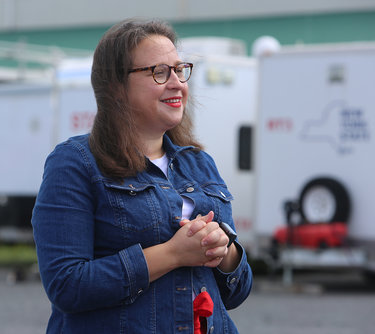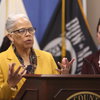Week CXXIV: Like Janus, NYS looks to its COVID past as it plans for the future
ALBANY COUNTY — This week, the governor said the state will look at its pandemic past while at the same time she talked about proposals for containing COVID-19 in the near future.
At the first press conference she’s held on COVID in months, Kathy Hochul, on July 20, announced a request for proposals was released for an independent After-Action Review of the state’s COVID-19 response.
She also revealed findings from a survey, gauging New Yorkers’ feelings on safety and use of vaccines, tests, and antiviral drugs.
Finally, she went over plans for fall when, during the past two years, as people moved indoors and schools resumed, cases of COVID-19 have increased.
Meanwhile, statewide and in Albany County, COVID cases continue to increase, although tracking them is difficult since so many people use at-home tests and don’t report results while others don’t test at all.
Albany County continues to have a “medium” community level of COVID-19, according to the Centers for Disease Control and Prevention.
In a flip from last month, most of the counties in New York State (except on Long Island and in New York City) are designated “low” as are most of the counties in New England while much of the rest of the country is labeled “medium” or “high.”
Nationwide, 42 percent are labeled “high,” 38 percent are labeled “medium,” and just 20 percent are labeled “low.”
Albany County now reports 573 deaths from COVID-19.
Currently, according to the state’s dashboard, Albany County has 23.6 cases per 100,000 of population as a seven-day average (up from 20.4 last week) while statewide that number is 34.8.
Fall Action Plan
“It’s still with us,” Dr. Ashish Jha, the White House COVID coordinator, who spoke remotely at the July 20 conference, said of COVID-19.
The next day, July 21, the White House issued a statement, saying President Joe Biden had tested positive for COVID.
“He is fully vaccinated and twice boosted and experiencing very mild symptoms,” the statement said. “He has begun taking Paxlovid.” It said Biden would carry on with his full duties while isolating, according to CDC guidelines.
Jha noted that the Omicron subvariant BA.5 now makes up 70 to 80 percent of all cases in the United States, causing high levels of reinfection and a lot of break-through infections.
Addressing people over 50 who have not been vaccinated or boosted in the last six months, Jha said, “You need to go out and get one now.”
This can prevent severe infections and hospitalization, he said. Jha also said a new generation of vaccines is expected in the fall.
“Getting vaccinated now will not make you ineligible for that,” Jha said.
Hochul noted that a second booster is approved only for people 50 and older and for children 12 and older with weakened immune systems.
“We are pushing the federal government to expand this,” she said.
Hochul cited findings from a June survey of New Yorkers to find out “how they’re adapting to the new normal.”
About 90 percent feel somewhere between neutral to very safe, she reported, and about 75 percent believe that vaccines prevent transmission.
“People know about antivirals,” Hochul said, citing a figure of 70 percent, “but they don’t know how to access them.”
The state operates a free hotline — 888-TREAT-NY — so that people who test positive for COVID can be evaluated for treatment. Regardless of income or health insurance coverage, New Yorkers outside of New York City can call 888-873-2869 or complete an evaluation at the NYS COVID-19 ExpressCare Therapeutics Access website, which includes a telemedicine visit.
Finally, Hochul said that 80 to 90 percent of New Yorkers said they have no trouble accessing at-home tests.
The federal government is now dispensing a third round of at-home tests for free. Each order will include eight rapid antigen tests, sent through the United States Postal Service. They can be ordered online at: https://special.usps.com/testkits.
Hochul stressed, “Kids need to be in school.”
In preparation for the opening of schools, over three million test kits are being distributed to districts across the state “to make sure that every student and member of their staff can test before the first day,” she said.
The state has a stockpile now of about 20 million tests that will be used to protect the 2.6 million children in schools along with school staff, she said.
Also, personal protective equipment is being stockpiled.
Hochul noted that requiring masks in school was “a big issue last year.” In the fall, masks won’t be required at school, Hochul said.
“But,” she said, “I’m going to reserve the right to return to this policy. If the numbers change, the circumstances change, and the severity of the illnesses changes or, god forbid, there is a variant that affects kids more severely.”
Another part of the fall strategy is having vaccinations and booster shots available, said Hochul, noting that 99 percent of New Yorkers “live within a drivable distance of a vaccine provider.”
The state is prepared to set up mass vaccination sites if needed, Hochul said, stating, “We don’t always know that we can count on the federal government. You know, send in the cavalry. We don’t know that they’ll be there with the money that they had been in the past.”
The fall plan also calls for strengthening hospital systems and preparing to ramp up the state’s Surge Operations Center “to deploy people to different parts of the state,” said Hochul.
After-Action Review
The purpose of the After-Action Review, Hochul said, is to review New York’s pandemic response, identify what worked and what didn’t work, and examine how the state’s response could have been better.
The review is also to be used as a guide for the state and other governments to use in responding effectively to other emergencies, from pandemics to natural disasters.
Bill Hammond, senior fellow for health policy at the Empire Center, a not-for-profit, non-partisan think tank in Albany, said in a statement that a commission should have been appointed to do the review rather than hiring a consultant firm.
“This likely means that the researchers will not have subpoena power to obtain records or compel testimony, nor conduct hearings to solicit public input,” Hammond said in a statement. “The researchers would also report to the governor rather than directly to the public — creating a risk that politically sensitive findings and recommendations could be buried or altered.”
He called on Hochul or the legislature to set up an independent pandemic research commission to take charge of the project.
At her July 20 press briefing, Hochul said she had planned to launch the review when the pandemic was gone. “It’s becoming clear to me that it’s not gone, so we’re not going to wait any longer to start some analysis,” she said.
As New York is the first state to undertake such a review, Hochul said, it could serve as a blueprint for others to follow.
“We’re going to be covering policies related to medical procedures, and hospitals, and patient facilities, the transfer of individuals, vulnerable populations in congregate settings, homeless shelters, group homes, nursing homes, jails, prisons, and how efficient the infection controls were in those settings,” she said.
The effect of shutting down schools as well as shutting down the economy will also be studied, Hochul said.
Benefits will also be reviewed including the future of remote work and areas like telehealth services, she said.
Which businesses and industries are essential will be considered as well as “how we secure essential goods and services,” said Hochul.
The contract will be for one year, Hochul said, and she’s asked for initial findings in six months “to make sure everything’s on track.”
Jackie Bray, the state’s commissioner of Homeland Security and Emergency Services, will oversee the review.
“The RFP specifically says that any consulting firm that was involved in advising during the pandemic would not be included,” Hochul said, “because we want to make sure that there’s complete independence.”
According to a release from the governor’s office, these are some of the major issues the review will focus on:
— Policies and guidance on the management of hospitals and in-patient facilities in light of the pandemic’s demands, including which medical procedures could and should continue;
— Guidance for the transfer of individuals, particularly the most vulnerable individuals, into congregate settings, including homeless shelters, group homes, nursing homes, jails and prisons, and which entities are most qualified to make those decisions and the efficacy of infection controls within those entities;
— Policies for the shutdown and reopening of educational institutions, and how early childhood, school-age, special education and post-secondary educational programs were handled during COVID-19 and how they should be handled in a future emergency;
— Factors for determining which businesses, industries, and functions should be considered essential and for what purposes;
— The securing and procurement of essential goods and services to meet New Yorkers’ needs;
— The protection needed for essential workers in the workplace, and programs and services needed by these workers, who are often from low-income communities of color;
— Coordination among and between the state and its federal and local counterparts, including relationships with mayors, county leaders, and other elected officials;
— Effective education and communication with the public, including the sharing of data and other information; and
— Staffing and expertise needed to plan and implement emergency procedures and specific functions that must be fulfilled.
Murphy honored
Anita Murphy is the first school district superintendent in New York to win the 2022 National School Public Relations Association’s Bob Grossman Leadership in School Communications Award.
Murphy, who has been the Capital Region BOCES district superintendent since 2017, was credited with leading the 24 school districts in the local Board Of Cooperative Educational Services during the COVID-19 pandemic.
“A key cornerstone of our #24United strategy has been communication,” she said in accepting the award at the association’s recent conference. “You cannot underestimate the power in 24 school districts all releasing the same message. All giving parents, students, and staff the same reassurance.
“When you know you’re getting the same information, the same guidance, the same path forward as your neighbor down the road — that your kids are being given the same resources and opportunities as the kids in the neighboring community — that makes the crisis that much easier to weather.”
Jobs
Albany County has an unemployment rate of 3 percent, according to June figures released this week by the state’s labor department.
Private-sector jobs in New York State increased over the month by 19,700 or 0.2 percent to close to eight million in June 2022.
The number of private-sector jobs in the United States increased by 0.3 percent in June 2022.
Compared to last year’s June numbers, private-sector jobs in New York increased by 5.7 percent. The state’s seasonally adjusted unemployment rate held constant at 4.4 percent in June 2022, following five consecutive months of decline.
From June 2021 to this June, the unemployment rate fell from 7.5 percent to 4.4 percent.
Leisure and hospitality saw the greatest increase in jobs — 136,100 — an increase of close to 18 percent.



